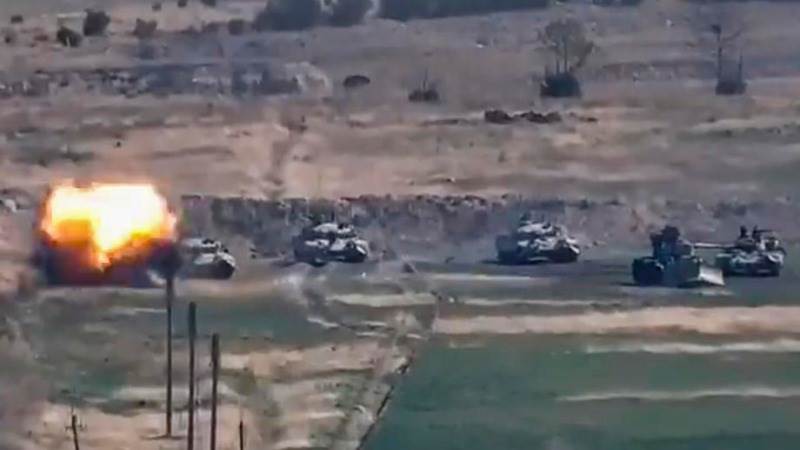Alwaght- Nearly 100 people, including civilians, have died as heavy exchange of fire between neighbors Armenia and Azerbaijan in the disputed Nagorno-Karabakh territory continued into the third day on Tuesday.
Military officials from both sides confirmed that fighting went on throughout the night, each claiming to have inflicted military and human losses on the other side.
According to Armenia's Defense Ministry, Azerbaijan’s military offensives were repelled at several points of the battlefield and “the enemy suffered serious losses in manpower.”
Azerbaijan has not reported any military casualties, only confirming several civilian deaths.
The death toll from clashes increased to 95 on Monday, with Karabakh confirming the loss of 84 forces. 11 civilians were also reported dead: nine in Azerbaijan and two on the Armenian side.
Azerbaijan’s Defense Ministry said it had repelled “Armenia's attempted counter-offensive to win back positions it lost to Azerbaijani forces.”
The ministry added that an Armenian motorized column and an artillery unit had been destroyed in overnight clashes.
In the early hours on Tuesday, "Azerbaijani forces continued an offensive on the city of Fizuli, destroying four enemy tanks, an armored vehicle and killing ten troops."
The sides exchanged heavy fire on Monday and pounded each other’s positions with rockets and artillery in the heaviest round of fighting in more than 25 years.
Nagorno-Karabakh, allied with Armenia, said 53 of its troops had been killed in clashes with Azeri forces on Monday, and 31 of its soldiers had been killed and 200 had been wounded following an offensive by Azerbaijani forces on Sunday.
“This is a life-and-death war,” said Nagorno-Karabakh leader Arayik Harutyunyan during a press briefing on Monday, alleging that the Azeri army had initiated a major attack targeting Matagis and Talish and areas alongside the Araks River.
Nagorno-Karabakh further announced the recapture of some territory lost on Sunday, but the region’s leader added later that neither the Azeri army nor the Armenian military had seized any tactical positions during the Monday fighting.
While Azerbaijan has not yet reported any military casualties, the separatist officials in Nagorno-Karabakh released footage showing burnt-out armored vehicles and the bloodied and charred remains of soldiers in camouflage, identifying them as Azerbaijani soldiers.
Baku, however, claimed further advances in the latest fighting, with the Azeri Defense Ministry declaring that Azerbaijani forces “are striking enemy positions… and have taken several strategic positions around the village of Talish.”
“The enemy is retreating,” it said, accusing separatist forces of shelling civilian targets in the town of Terter.
But Armenian Defense Ministry spokeswoman Shushan Stepanyan said Armenian separatist forces had won back positions taken by Azerbaijan on Sunday.
Moreover, the Azerbaijani general prosecutor’s office also announced that two Azeri civilians had been killed on Monday.
Azerbaijan’s President Ilham Aliyev ordered partial military mobilization on Monday and senior General Mais Barkhudarov pledged to “fight to the last drop of blood in order to completely destroy the enemy and win.”
Karabakh is internationally recognized as part of Azerbaijan, but it has an Armenian population because ethnic Azeris fled the territory in 1992 when separatists seized it in a move supported by Yerevan after the collapse of the Soviet Union.
The latest fighting over the decades-long territorial dispute started on Sunday.
The flare-up is due to the failure of diplomatic negotiations within the framework of the Organization for Security and Cooperation in Europe (OSCE) Minsk Group, led by France, the US, and Russia.
The key sticking point is Azerbaijan’s demand that Armenia withdraw its military forces from Karabakh and let Azeris return to their homes, while Yerevan is apparently satisfied with the stalemate because it allows the status-quo to continue.
The new clashes, the heaviest since 2016, have rekindled concern over stability in the South Caucasus region, a corridor for pipelines carrying oil and gas to world markets.
Meanwhile, Armenia’s parliament censured the “full-scale military attack” by Azerbaijan on Nagorno-Karabakh.
Armenian Foreign Ministry spokeswoman Anna Naghdalyan further accused Turkish military experts of fighting alongside Azerbaijan, alleging that Ankara had provided drones and warplanes to Baku. Azerbaijan, however, denied the allegations.
Turkish President Tayyip Erdogan demanded that Armenia immediately leave the Azeri lands that it was holding, underlining that it was time to end the Nagorno-Karabakh crisis.



























